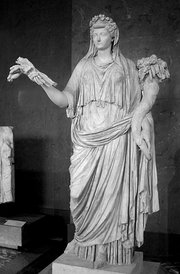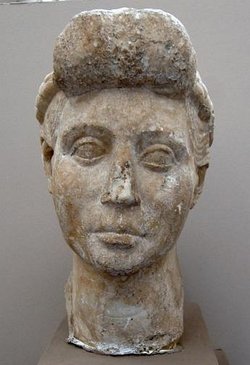Livia
|
|

Livia Drusa Augusta, Livia Drusilla, or Julia Augusta (58 BC-AD 29) was the wife of Caesar Augustus and the most powerful woman in the early Roman empire, acting several times as regent and being Augustus' faithful advisor. She was also mother to Emperor Tiberius and Drusus, grandmother to Germanicus and Claudius, great-grandmother to Caligula and Agrippina the younger and great-great-grandmother to Nero. She was deified by Claudius who acknowledged her title of Augusta.
| Contents |
Marriage to Augustus
She was born in 58 BC as the daughter of Marcus Livius Drusus Claudianus by his wife Alfidia. Her mother Alfidia was a daughter of Aufidius Lurco, a Roman Magistrate from an Italian town. In 42 BC, her father committed suicide in Philippi, Greece along with Cassius and Brutus, the assassins of Caesar, who were defeated by Octavian and Mark Antony. The diminutive Drusilla often found in her name suggests that she was second daughter. For Livia's portraiture and representations see: Rolf Winkes, Livia, Octavia, Iulia- Portr䴳 und Darstellungen- (Archaeologia Transatlantica XIII) Louvain-la-Neuve and Providence 1995.
Around 42 BC she married Tiberius Claudius Nero, her cousin of patrician status. After the civil war that followed the assassination of Julius Caesar, Claudius Nero was in the opposite side of Augustus. The family survived the prosecutions and met Augustus in 39 BC. At this time, Livia already had a son, the future emperor Tiberius, and was pregnant of the second (Drusus the Elder). Legend said that Augustus fell immediately in love with her and they got married the day after both their divorces were announced. Apparently, Claudius Nero agreed to let her go and was present at the wedding. The importance of the patrician Claudii to Augustus' cause against opposition, and the political survival of Claudius Nero are probably the more rational explanations for the tempestuous union. Nevertheless, Livia and Augustus remained married for the next 52 years, despite the fact that they had no children, and she always enjoyed the status of a privileged councillor to her husband.
Livia, Roman empress
After Mark Antony's suicide following the Actium in 31 BC, Augustus met no opposition to his increasing power, eventually becoming Roman Emperor always with Livia by his side. Together, they formed the role model for Rome. Despite his riches and power, Augustus and his family continued to live modestly in their house on the Palatine Hill. Livia would set the pattern for the noble Roman matrona. She wore neither excessive jewellery nor pretentious costumes, she took care of the household and her husband (often making herself his own clothes), she paid no attention to his notorious womanising, always faithful and dedicated.In 35 BC Augustus gave Livia the unprecedented honour to rule her own finances, dedicated a public statue to her. She had her own circle of clients and pushed many prot駩s into political offices, including Otho's grandfather and Galba himself.
With Augustus being the father of only one daughter (Julia Caesaris by Scribonia), Livia revealed herself to be an ambitious mother and soon started to push her own sons, Tiberius and Drusus into power. Rumor had it that she secretly was the cause of death for the original successors, Augustus' nephew. Tiberius was adopted by his stepfather in AD 4 and married Julia in AD 11. Drusus was a trusted general and married Augustus' favourite niece, Antonia Minor. One by one, all the sons of Julia Caesaris by Marcus Vipsanius Agrippa died, and Tiberius was nominated heir to the Empire. Tacitus charges that Livia was not altogether innocent of these deaths and others, but there is no other support from either contemporary historians or even later ones with access to official documents (like Suetonius). Most modern historical accounts of her life discount the idea.
Widow
Augustus died in AD 14, being deified by the senate shortly afterwards. In his will, he left one-third of his property to Livia, and the other two-thirds to the successor Tiberius. In the will, he also adopted her into the Julian family, thus turning her into a patrician, and granted her the honorific title of Augusta. These dispositions permitted her to maintain her status and power after his death.
For some time, Livia and her son Tiberius, the new Emperor, got along with each other. Speaking against her became treason in 20 and, in 24 he granted his mother a theatre seat among the Vestal Virgins. Eventually, Tiberius became resentful of his mother's political status, particularly against the idea that it was she who had given him the throne. He forbade the senate to call her Augusta and removed most of the privileges granted by Augustus.
When Livia died in 29, Tiberius had already revealed his cruel nature. He was governing Rome by proxy from Capri and refused to come to her funeral. Later he vetoed all the honours the senate had granted her after her death and cancelled the fulfilment of her will. Her villa north of Rome is still a spectacular site.

